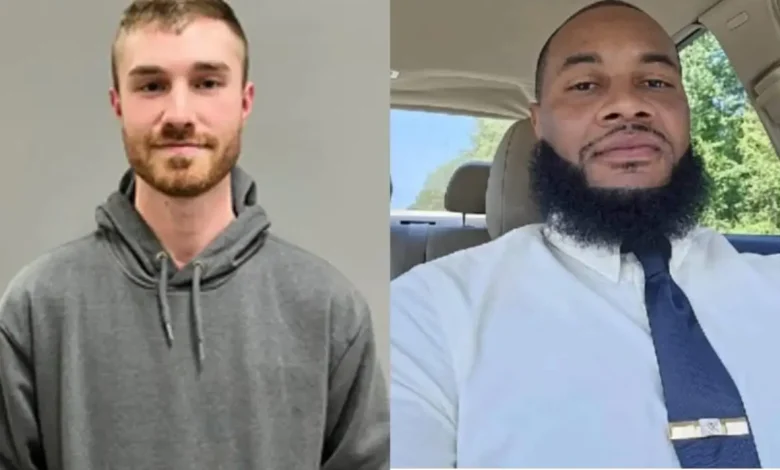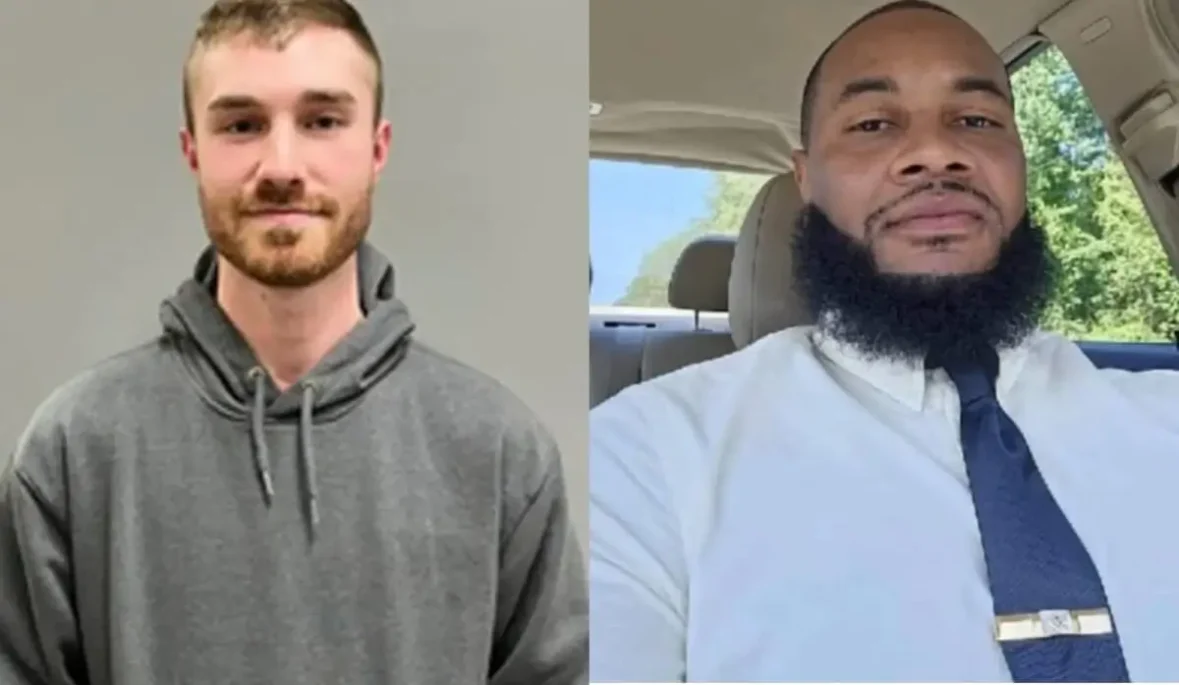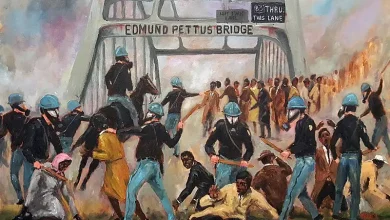Alabama Cop Caught On Camera Gunning Down Black Man While Illegally Aiding with Repo Seeks Immunity Through ‘Stand Your Ground’ Law In Murder Case

Attorneys for an Alabama police officer charged with murder in the death of an armed Black man outside his home argued Tuesday their client should be immune from prosecution due to the state’s “stand your ground” law, which allows an individual to use deadly force as long as they can credibly claim their safety was endangered.
Former Decatur, Alabama police officer Mac Marquette, 25, who is white, was accompanying a tow-truck driver to repossess 39-year-old Stephen Perkins’ truck at the victim’s residence, where the fatal confrontation unfolded.
Three other officers — Joey Williams, Vance Summers, and Christopher Mukkadam — were working with Marquette on that early morning call in September 2023.

“There were four officers at the scene when this incident occurred, and there was only one officer who fired any shot,” Morgan County District Attorney Scott Anderson said in regard to the murder charge.
Marquette and the other officers were dispatched to help Caleb Combs after he called the police to report Perkins for allegedly pointing a gun at his chest when Combs tried to repossess his truck. Combs, who was authorized by Perkins’ creditor to repossess the truck, told police he wanted to retry the seizure but said he “would not go back alone.”
Alabama law, however, requires a judge’s authorization if there was a “breach of peace” during an attempted seizure. Without it, law enforcement’s presence is prohibited.
Though all agreed there was a “breach of peace,” no court authorization was obtained. To receive immunity, Marquette’s attorneys must prove he had a right to be on Perkins’ property in the first place.
Regardless, their approach gave Perkins little time to process what was happening, prosecutors argued.
“There was no way that Steve Perkins could have known that police were on the scene until about one and a half seconds before he was shot and killed,” said prosecutor Garrick Vickery.
Each of the officers were out of sight from the victim’s front door when Combs returned to Perkins’ home with his tow truck, according to body camera video. Marquette and another officer, Joey Williams, stood at the side of the house.
Attorneys focused on a beam visible in the body camera video, cast by a tactical light attached to Perkins’ handgun, to show where his weapon was pointed when he emerged from his house for the second time. When Combs tried again to repossess Perkins’ pickup truck, the beam appeared to indicate that Perkins pointed his gun towards Combs.
Marquette is then seen, on both body cameras, rounding a corner to confront Perkins. In a matter of seconds, Perkins appears to point the gun at Marquette, who shouts, “Police, get on the ground,” and almost instantly fires at least 17 bullets, killing the father of two.
Initially, officers said that when they arrived, Perkins was threatening the tow truck driver with his firearm. They alleged he then waved it “towards an officer with the Decatur Police Department,” according to the Alabama Law Enforcement Agency.
The DPD officers said they ordered him to drop his weapon, and he refused. They alleged that once Perkins directed the gun at Marquette, the officer responded with the fatal shots.
But that account didn’t match up to surveillance footage from a neighbor’s Ring doorbell camera from that night that indicated the officers never identified themselves, instead hiding beside Perkins’ house and across the street upon their arrival.
The body cam evidence seems to show that, just before Marquette opened fire, the light from Perkins’ gun appeared to be pointing upwards against his house, away from the officer. Prosecutors say that suggests Perkins tried to raise his arms in surrender before he was killed.
Lee Merritt, an attorney representing Perkins’ family, has filed a federal civil rights lawsuit against the officers, who Merritt said “ambushed” the victim, a manager at JM Smucker’s pet food manufacturer.
Perkins said Merritt had ventured onto his front lawn that morning to investigate why his dog was barking. The officers had surrounded his property, and they “revealed themselves and simultaneously opened fire.”
Perkins never fired any bullets, though his gun was found with a “depressed trigger,” according to the state law enforcement agent who investigated the shooting. The agent, Jamie King, said it is not clear when the trigger was pulled and that the chamber was empty.
Marquette told investigators immediately after the shooting that it was “the most scared” he’d ever been.
King said Tuesday the officers had “reasonable belief that Perkins was going to use deadly force” and had to make a quick decision. But he also questioned why the officers were there in the first place, adding they could have employed different police tactics that would’ve lessened the possibility of a violent ending.
King said that officers “exceeded the scope” of their responsibilities because they didn’t have a court order authorizing the vehicle seizure.
More than 100 people filled the courtroom to capacity on Tuesday in Decatur, a town of roughly 60,000 people that has been sharply divided by the case. Decatur Mayor Tab Bowling terminated three of the officers and placed another on suspension in December 2023.
Marquette and the other officers had their fair share of support, with many in the courtroom sporting “back the blue” T-shirts. Across the aisle, sitting with Perkins’ family, many onlookers wore “#IAmStevePerkins” shirts.
The hearing concluded Wednesday morning. Judge Charles Elliott pledged to “review everything” before rendering a decision.
If immunity is denied, Marquette’s trial will begin April 7.




